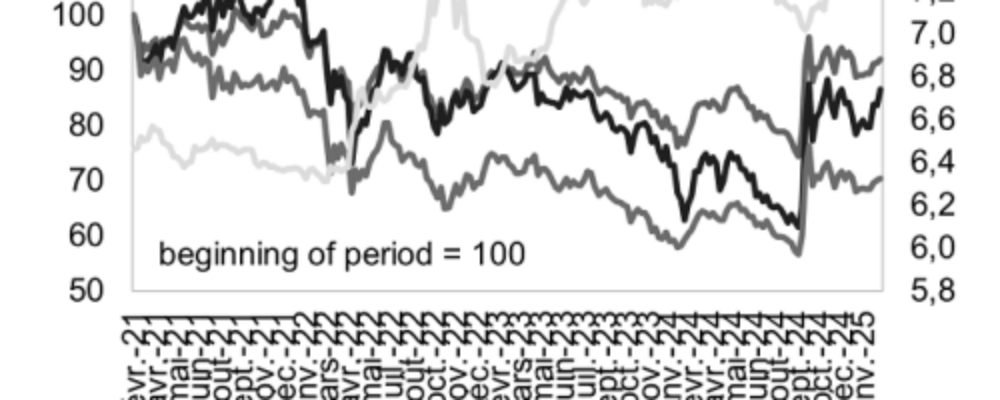Thanks to the proliferation of APIs1 and the advent of Open Banking2, these FinTechs have specialised first and foremost in collecting, refining and structuring business data, notably banking and financial data.
They mass process information such as bank statements, customer and supplier billing histories and activity data from e-commerce and advertising platforms. All this data is then fed into proprietary algorithms that evaluate and score businesses seeking funding.
Their core expertise thus lies in these credit scoring and lending algorithms, which promise to deliver a product that is not only low-cost but also augmented by data aggregation, digitalised processes and immediate decisions.
In an environment where liquidity is drying up for FinTechs, these finance start-ups have continued to attract investors and strategic partners. With Silvr having already secured some €330 million3 since 2022, Defacto obtained €167 million4 from Viola Credit and in July this year. This financial windfall will help give French algorithmic lending a boost in 2024 in a short-term loan market worth €326 billion5.
Significant efficiency gains
Founded in 2020 and backed by powerful shareholders and debt partners such as Bpifrance, Eurazeo, Otium Capital and Citigroup, Silvr says it has made significant progress6 in processing raw, unscreened business data from business customers seeking funding.
Thanks to automated processes that refine and categorise this data, the FinTech says it can build up a picture of its very small, small and medium-sized business customers’ cash flows – something that would take a traditional bank two hours of mainly manual labour and cost an average of €60 – in a record time of 12 seconds and at a modest cost of €1.
This means Silvr can agree loans almost immediately after assessing a borrower’s financial profile and historical and future activity.
A question of fairness
At first blush, then, France’s very small, small and medium-sized businesses benefit fully from these recent improvements in the lending process. Borrowers can access a new source of funding within very short timescales and at market rates thanks to an improved ability to leverage their business data – data which, due to its dispersion, has little unit value on its own.
However, this ability to originate loans at very low cost raises questions as to the fair allocation of gains to businesses that are providing their most sensitive data free of charge. This data is being fed into algorithms whose workings are largely opaque. This type of origination process can also sometimes be very expensive for borrowers: for example, in the case of loans granted by Silver, it can be billed at up to 9% of the amount financed7.
It is undeniably the case that we as yet know very little about the design, workings or real cost of these rarely audited algorithms or the reliability of their results they produce. Moreover, such algorithms sometimes act as both judge and jury in the loan origination process. As well as scoring the business, they review and evaluate the loan application and immediately decide whether or not to agree the loan.
The right to know
An SME that agrees to its data being hoovered up and processed free of charge by these FinTechs’ proprietary algorithms for the purpose of obtaining a loan might legitimately ask to be informed of its credit score, for example if its loan application is refused.
Conversely, a borrower with a high score might want to be able to “port” that score so it can leverage it outside the confines of its contractual relationship with the FinTech.
In the world of traditional finance, France’s Brunel Act, passed in October 2009, requires banks to provide businesses “that apply for or have loans with an explanation of those factors that have contributed to scoring decisions concerning them, on request”8.
This requirement should logically also apply to finance start-ups involved in scoring businesses for the purpose of financing, even though they are not banks in the traditional legal sense of the term. Yet Defacto and Silvr both admitted at a recent panel discussion on alternative finance that they were unable to provide their customers with this sensitive scoring data9.
However, Defacto says it can, on request, provide customers with an explanation of the decisions made by its algorithm based on five or six key indicators. In a way, then, the FinTech could be said to be tacitly applying the Brunel Act and its principle of the “right to know”.
Meanwhile, Silvr acknowledges that, generally speaking, the results churned out by algorithms may be subject to debate. The start-up tends to discuss such matters with its strategic partners rather than the customers it lends to. Reading between the lines, one might conclude that customers are not too bothered about the process that leads up to a lending decision or the score generated by the algorithm.
In search of innovation
As set out in an article in Le Monde on 30 August10, when it comes to scoring small and medium-sized businesses, every year Banque de France allocates “companies domiciled in France turning over more than €750,000 a rating assessing their financial health” thanks to “its network of a thousand or so analysts all over France”.
Despite this impressive feat which, according to Le Monde, covers “some 300,000 companies” every year, innovators in the credit scoring market see Banque de France as having a near-monopoly in this area – a state of affairs which, from their perspective, hampers innovation in credit scoring. This situation could be preventing French businesses from maximising the benefits derived from the value of their credit scores.
At the heart of the debate surrounding financial ratings11, Arnaud Caudoux, Deputy CEO of Bpifrance, offers an insightful perspective, highlighting the urgent need to make the credit scores of very small, small and medium-sized businesses as responsive as possible so as to better serve borrowers. With this in mind, it is vital that these scores evolve to become more dynamic, offering a constantly updated picture of borrowers’ economic and financial health.
This kind of progress would increase the value of credit scores to the businesses to which they relate. In keeping with this goal, Mark Kepeneghian, founder of Kriptown, which uses digital assets to facilitate equity funding for small and medium-sized businesses, has announced that he is in talks with the Banque de France12.
Initiatives like this, together with mounting pressure for transparency around credit scores, could prompt alternative finance operators to explore the possibility of making their innovative scores portable so businesses can benefit from them in other areas, thus paving the way for their value to be more effectively leveraged.
“Crédit Agricole Group, sometimes called La banque verte due to its historical ties to farming, is a French international banking group and the world’s largest cooperative financial institution. It is France’s second-largest bank, after BNP Paribas, as well as the third largest in Europe and tenth largest in the world.”
Please visit the firm link to site






